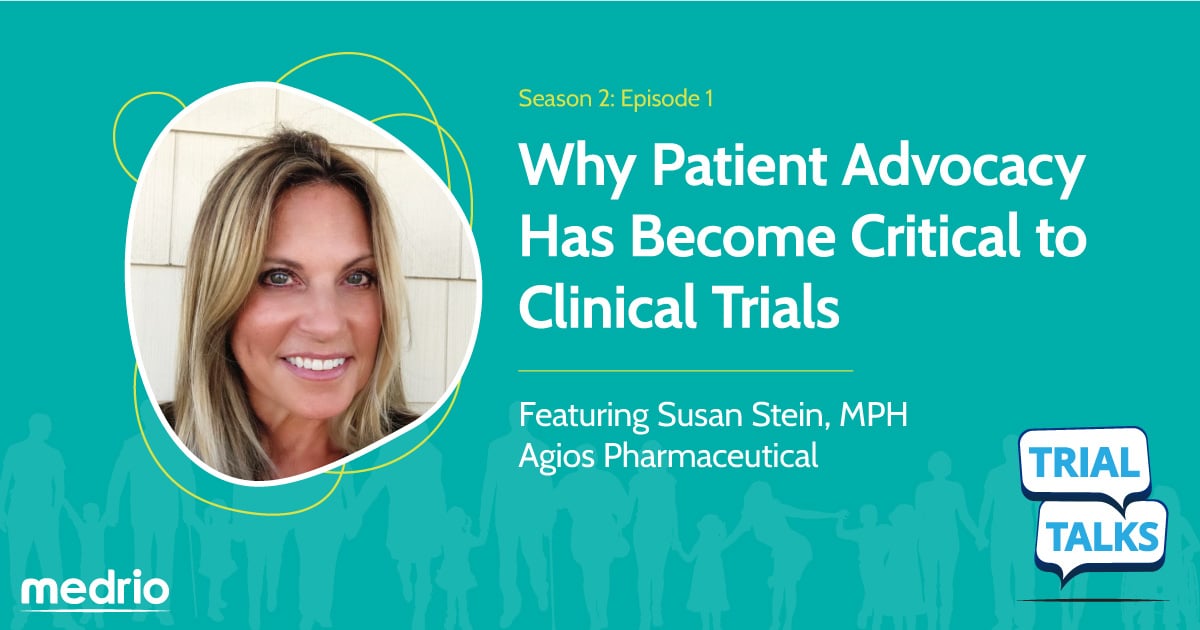What benefits have you seen clinical trials realize as a direct result of patient advocacy? [2:30]
There’s a saying in patient advocacy that says, “Nothing about us, without us,” and that really just goes to say that if you really want to know what’s happening with patients, then you just need to ask them. For so many years, we relied on other stakeholders to give us information about patients and it really doesn’t make any sense when you talk about it.
What is your process when you’re assisting in the development of a clinical trial protocol from a patient advocacy standpoint? [5:00]
A lot of times drug developers bring in patients later on when they want to go to marketing, but the real time to bring them in as early on, as early as you possibly can and as often as he possibly can… Or sometimes we forget about how brave you have to be to enter a clinical trial and how much of a burden it is on patients to enter a clinical trial. I think we always need to remember that and really understand the patient perspective on clinical trials.
You work a lot in oncology and rare disease. Would you say that these two therapeutic areas are more inclined to incorporate the patient’s voice than others, and if so, why? [8:40]
I do think that oncology and rare disease include the patient voice a lot, and there’s reasons for that. One is because, especially in a rare disease, there’s very little information and very little history on the disease. And the only way to really get that is to go through the patient. So it makes sense to bring the patients into their world very often. And then the same thing with oncology, especially with all the targeted therapies.
Do you see patient advocacy as an avenue to increase diversity in clinical trials? [11:05]
Yes, I do. I think that patient advocacy groups are really important in our ecosystem. They do an amazing job and they’re run by angels that are fighting the fight for everyone right now. They take a really good holistic look at health and wellness and what does that look like for patients. We have to do a better job about diversity in clinical trials, because we really need to make the clinical trials look like the people that we are serving. We are not serving a homogeneous group or serving a very diverse group and we need to make clinical trial participation look like that.
Do you believe that more pharmaceutical and biotech companies will increase engagements with patient advocates, whether it’s externally or having actual divisions and teams within their companies? [13:00]
Christina, that’s such a great question. Right now patient-centricity is such a buzz word that’s used by so many people within this industry and it’ll be in every corporate presentation that you’ll see at every financial conference. I do think that there are some that really believe it and it’s part of their DNA, and I think that there’s some that just sort of have a check box. I hope that more and more people really make it ingrained into their organization.
Has COVID had an impact on this engagement with patient advocates or patient advocacy groups, either in a positive or negative way? [14:30]
I think like so many things, we’re going to really take a look at this and be studying this for many, many years of the impact of what COVID has had. I think there’s some real immediate impacts that have been great, like obviously telemedicine. That’s been a good one, but you have to have policies to support that if we want to move that forward. What I mean by policies is reimbursement. So if physicians can’t get reimbursed for telemedicine, then it’s going to be hard to get them to really embrace that as part of their culture. I think that there are some things with COVID that have been very open from a policy standpoint. It’ll be interesting to see what happens later.
